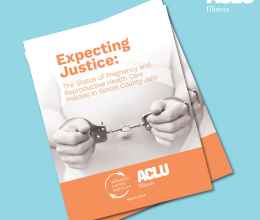 Share Your StoryLearn More Share Your StoryLearn More |
Too often, a pregnant worker is forced to make an impossible decision: keep working and risk her health and pregnancy or lose her job and ability to support her family.
But thanks to legislation approved by the Illinois House of Representatives last Thursday, pregnant women will soon have a real choice. Sponsored by Rep. Mary Flowers, House Bill 8 allows pregnant workers to stay on the job and support their families by requiring employers to provide reasonable accommodations to pregnant workers.
Most Illinois women cannot afford to quit their jobs when they become pregnant since they are their families’ primary or co-breadwinner, although they might need a temporary job modification to allow them to work safely.
That was the case of Rosaura Villanueva, who worked for a shipping company unloading heavy packages from trucks. When she became pregnant, her supervisor refused to reasonably accommodate her and instead presented her with that impossible choice: “Quit or lose your baby.” She continued to work without an accommodation and miscarried.
Federal and Illinois law require employers to treat pregnant women the same as non-pregnant workers who are “similar in their ability or inability to work.” In other words, an employer that allows a worker with a temporary back injury to have a light duty assignment or offers assistance with heavy lifting should, under current law, also have to allow a pregnant worker the same reasonable accommodation.
However, courts have limited this important protection. For example, the U.S. Court of Appeals for the Seventh Circuit, which is based in Chicago, rejected the case of Victoria Serednyj whose employer refused to accommodate her pregnancy (and ultimately fired her), even though the employer admitted that it accommodated other, non-pregnant workers.
House Bill 8 makes clear that no woman should be forced to choose between her job and a healthy pregnancy. Modeled after the Americans with Disabilities Act (ADA), House Bill 8 only requires “reasonable accommodations,” and like the ADA, the bill does not require an employer to provide an accommodation that would impose an “undue hardship” on the employer. Decades of experience show that the costs of accommodations are typically very low. Indeed, common pregnancy-related accommodations include permission to carry a water bottle, breaks to use the restroom, and a stool to sit on.
The bill heads to the Illinois Senate for consideration, and Governor Quinn has announced his support, stating that House Bill 8 “will ensure healthier women and babies, and a stronger workforce across the state.” The ACLU of Illinois urges the Senate to quickly pass House Bill 8.
If you have experienced pregnancy discrimination at work, tell us your story.





